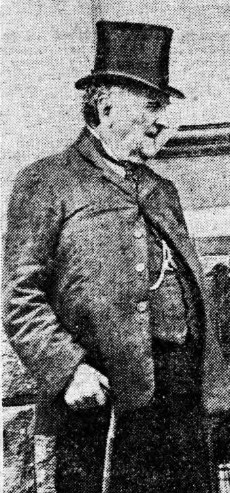Thomas Halliday (trade Unionist) on:
[Wikipedia]
[Google]
[Amazon]
 Thomas Halliday (18 July 1835 – 24 November 1919) was a
Thomas Halliday (18 July 1835 – 24 November 1919) was a
 Thomas Halliday (18 July 1835 – 24 November 1919) was a
Thomas Halliday (18 July 1835 – 24 November 1919) was a British
British may refer to:
Peoples, culture, and language
* British people, nationals or natives of the United Kingdom, British Overseas Territories and Crown Dependencies.
* British national identity, the characteristics of British people and culture ...
trade unionist
A trade union (British English) or labor union (American English), often simply referred to as a union, is an organization of workers whose purpose is to maintain or improve the conditions of their employment, such as attaining better wages ...
.
Born in Prestolee
Prestolee is a small village in Kearsley, within the Metropolitan Borough of Bolton, in Greater Manchester, England. It lies on the River Irwell and is one of a cluster of villages between Bolton and Kearsley, which includes Stoneclough and ...
near Bolton, Lancashire
Bolton ( , locally ) is a town in Greater Manchester in England. In the foothills of the West Pennine Moors, Bolton is between Manchester, Blackburn, Wigan, Bury and Salford. It is surrounded by several towns and villages that form the wider ...
, Halliday's father was killed in a mining accident when Tom was only two years old. Six years later, Halliday went to work at the same pit. After being badly injured falling partway down a shaft, he worked in a textile warehouse for a time, before returning to the mines, where he worked alongside his new stepfather.John Saville, "Halliday, Thomas (Tom) (1835-1919)", ''Dictionary of Labour Biography'', vol.III, pp.91-94
Halliday continued to work as a miner into his twenties, spending time in County Durham
County Durham, officially simply Durham, is a ceremonial county in North East England.UK General Acts 1997 c. 23Lieutenancies Act 1997 Schedule 1(3). From legislation.gov.uk, retrieved 6 April 2022. The county borders Northumberland and Tyne an ...
, Staffordshire
Staffordshire (; postal abbreviation ''Staffs''.) is a Ceremonial counties of England, ceremonial county in the West Midlands (region), West Midlands of England. It borders Cheshire to the north-west, Derbyshire and Leicestershire to the east, ...
and Yorkshire
Yorkshire ( ) is an area of Northern England which was History of Yorkshire, historically a county. Despite no longer being used for administration, Yorkshire retains a strong regional identity. The county was named after its county town, the ...
. He became interested in trade unionism, and in 1862 founded the Wigan Miners' Provident Benefit Society, followed in 1863 by the Farnworth and Kearsley District Miners' Union. This second union employed Halliday as its full-time agent, and through this role, Halliday became active in Alexander Macdonald Alexander or Alex MacDonald may refer to:
Politics
* Alasdair Óg of Islay (died 1299), Lord of Islay and chief of Clann Domhnaill
* Alexander of Islay, Earl of Ross, or Alexander MacDonald (died 1449), Scottish nobleman
* Alexander MacDonald, 5th ...
's Miners' National Association
The Miners' National Union (MNU) was a trade union which represented miners in Great Britain.
History
The union was founded in November 1863 at a five-day long conference at the People's Hall in Leeds. It was originally known as the National Ass ...
(MNA).
Halliday and William Pickard
William Pickard (10 February 1821 – 21 October 1887) was a British trade unionist.
Born in Aspull Moor in Lancashire, Pickard worked at a colliery from an early age. He became active in the Wigan District Miners' Union and, despite bein ...
became critical of Macdonald's cautious approach to trade unionism, and founded a new Amalgamated Association of Miners
The Amalgamated Association of Miners (AAM) was formed in 1869 in Lancashire, at a time of increasing industrial conflict in the British coalfields.
History
The union was founded by Thomas Halliday and William Pickard, two miners' union agents wh ...
(AAM), with Halliday as President. This new association advocated more militant action, including solidarity strikes, but continued to co-operate with the MNA, and even welcomed Macdonald to speak at its conferences. The AAM was initially successful, expanding across Great Britain and winning several strikes, proving particularly prominent in South Wales. This inspired Halliday to stand as a Liberal-Labour candidate in Merthyr Tydfil
Merthyr Tydfil () is the main town in Merthyr Tydfil County Borough, Wales, administered by Merthyr Tydfil County Borough Council. It is about north of Cardiff. Often called just Merthyr, it is said to be named after Tydfil, daughter of K ...
at the 1874 UK general election
The 1874 United Kingdom general election was held between 31 January to 17 February 1874. The Conservatives under the leadership of Benjamin Disraeli won a decisive victory against the incumbent governing Liberals under William Ewart Gladstone ...
, taking 25% of the vote, but only third place.
Following a downturn in the industry, the AAM went bankrupt in 1875 and was absorbed by the MNA (by then, renamed as the "Miners' National Union"). Halliday was elected as the secretary of the MNU, but in 1877 stood down to try to re-establish the AAM, working with William Abraham. Although he spent the next three years attempting to resurrect it, he was unsuccessful. He moved to South Wales, where he sold supplies to small collieries.
References